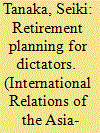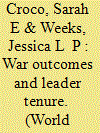| Srl | Item |
| 1 |
ID:
146164


|
|
|
|
|
| Summary/Abstract |
What happens to autocratic leaders who hold competitive elections? Autocrats gain a key benefit by holding competitive elections: a better post-tenure fate. According to my argument, autocrats who introduce competitive elections receive implicit or explicit assurances that they will be able to leave office and retire peacefully. By contrast, failing to hold a competitive election is more likely to result in a violent removal such as execution, prosecution and/or foreign intervention. The paper tests the argument by analyzing a cross-national data set of autocrats’ fates between 1960 and 2004, and the results provide evidence that autocratic leaders who hold competitive elections are more likely to lose power peacefully, and the result holds regardless of regime types.
|
|
|
|
|
|
|
|
|
|
|
|
|
|
|
|
| 2 |
ID:
149516


|
|
|
|
|
| Summary/Abstract |
A growing body of literature argues that war outcomes affect leaders’ tenure in office. But disagreement persists over how domestic political institutions translate performance in war into leader accountability. Some scholars argue that the tenure of democratic leaders is most sensitive to war outcomes, while others posit that autocratic leaders are more likely to be punished or rewarded for the outcomes of conflicts. The authors argue that existing research fails to take into account two important factors: whether the leader is viewed as culpable for the country's entry into the conflict, and whether the country features domestic institutions that make the leader vulnerable to removal from office, which varies greatly across nondemocracies. After taking leaders’ culpability and vulnerability into account, the authors show that the tenures of culpable, democratic leaders and culpable, vulnerable, nondemocratic leaders are sensitive to war outcomes. By contrast, the tenures of nondemocratic leaders who are less vulnerable to removal are not sensitive to war outcomes, regardless of their culpability.
|
|
|
|
|
|
|
|
|
|
|
|
|
|
|
|